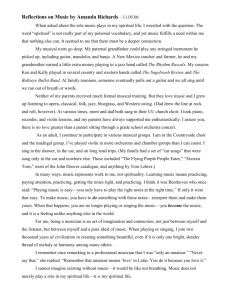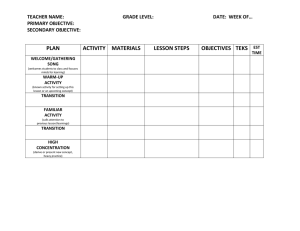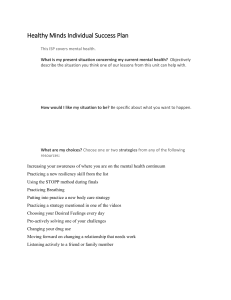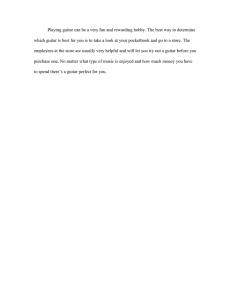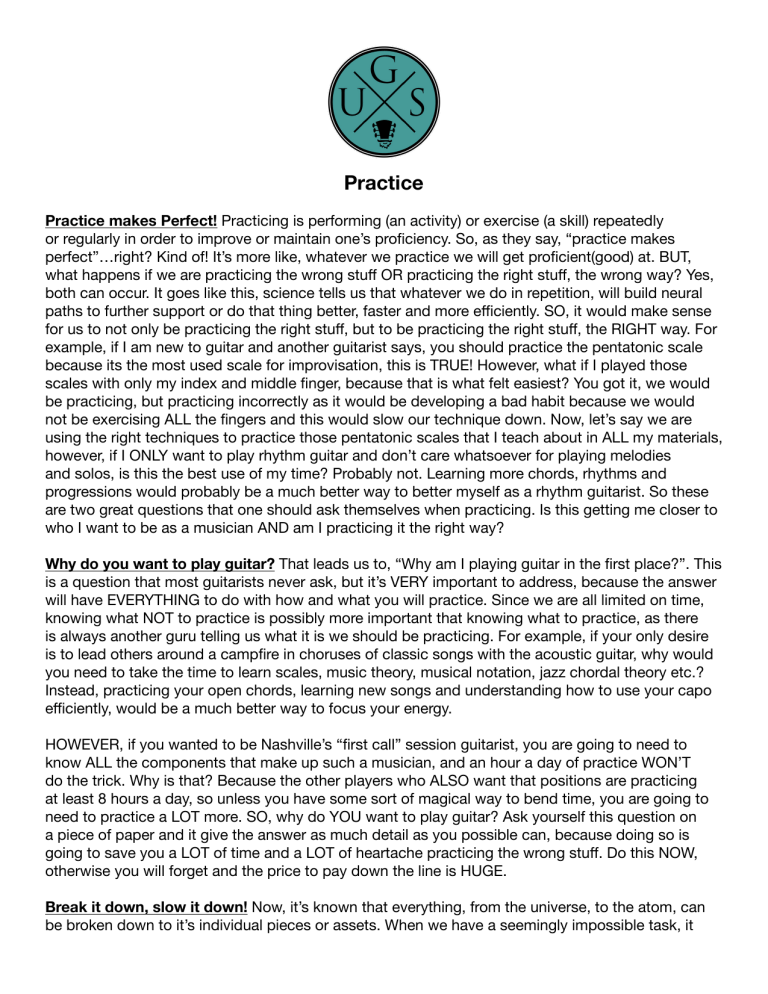
Practice Practice makes Perfect! Practicing is performing (an activity) or exercise (a skill) repeatedly or regularly in order to improve or maintain one’s proficiency. So, as they say, “practice makes perfect”…right? Kind of! It’s more like, whatever we practice we will get proficient(good) at. BUT, what happens if we are practicing the wrong stuff OR practicing the right stuff, the wrong way? Yes, both can occur. It goes like this, science tells us that whatever we do in repetition, will build neural paths to further support or do that thing better, faster and more efficiently. SO, it would make sense for us to not only be practicing the right stuff, but to be practicing the right stuff, the RIGHT way. For example, if I am new to guitar and another guitarist says, you should practice the pentatonic scale because its the most used scale for improvisation, this is TRUE! However, what if I played those scales with only my index and middle finger, because that is what felt easiest? You got it, we would be practicing, but practicing incorrectly as it would be developing a bad habit because we would not be exercising ALL the fingers and this would slow our technique down. Now, let’s say we are using the right techniques to practice those pentatonic scales that I teach about in ALL my materials, however, if I ONLY want to play rhythm guitar and don’t care whatsoever for playing melodies and solos, is this the best use of my time? Probably not. Learning more chords, rhythms and progressions would probably be a much better way to better myself as a rhythm guitarist. So these are two great questions that one should ask themselves when practicing. Is this getting me closer to who I want to be as a musician AND am I practicing it the right way? Why do you want to play guitar? That leads us to, “Why am I playing guitar in the first place?”. This is a question that most guitarists never ask, but it’s VERY important to address, because the answer will have EVERYTHING to do with how and what you will practice. Since we are all limited on time, knowing what NOT to practice is possibly more important that knowing what to practice, as there is always another guru telling us what it is we should be practicing. For example, if your only desire is to lead others around a campfire in choruses of classic songs with the acoustic guitar, why would you need to take the time to learn scales, music theory, musical notation, jazz chordal theory etc.? Instead, practicing your open chords, learning new songs and understanding how to use your capo efficiently, would be a much better way to focus your energy. HOWEVER, if you wanted to be Nashville’s “first call” session guitarist, you are going to need to know ALL the components that make up such a musician, and an hour a day of practice WON’T do the trick. Why is that? Because the other players who ALSO want that positions are practicing at least 8 hours a day, so unless you have some sort of magical way to bend time, you are going to need to practice a LOT more. SO, why do YOU want to play guitar? Ask yourself this question on a piece of paper and it give the answer as much detail as you possible can, because doing so is going to save you a LOT of time and a LOT of heartache practicing the wrong stuff. Do this NOW, otherwise you will forget and the price to pay down the line is HUGE. Break it down, slow it down! Now, it’s known that everything, from the universe, to the atom, can be broken down to it’s individual pieces or assets. When we have a seemingly impossible task, it can ALWAYS be broken down into smaller, more doable/possible tasks. Doing so not only allows our minds to believe that the outcome is possible, it also gives a sense of forward momentum. As opposed to feeling a sense of accomplishment once we have scaled a mountain, how pleasant would it be that after each milestone/phase we accomplish, we have a sense of fulfillment that continues to pull us forward? This my friend, is one of the secrets to successful, effective practice that allows us to FINALLY realize our goals, instead of being a “wisher”. And often times when it comes to big shifts like this in our lives, we first must make a mental shift before anything else will move. You know how I always says that playing guitar is 80% psychology? THIS is exactly the kind of stuff that I am talking about. So how do we break things down? The easiest way is to SLOW things down. In doing so, it’s like using a magnifying glass on something that we cannot see very clearly. Another way is to break something down into its individual assets. For example if we have a song that we are singing and playing at the same time, I might learn each of these parts individually before putting them all together: • What chords are being played and can I play them? • Learn the progression of chords as they appear in the song. • Learn the strum. • Play the strum with the progression at tempo. • Learn the song lyrics. • Learn the song melody. • Perform them with a track. • Sing the lyrics with the chord progression(slow it down if necessary) All the while, I would most likely be doing this for ONE section of a song instead of all the sections AND I would be slowing it down to a comfortable pace that was doable. No need in performing to tempo, if it’s sloppy or lyrics/chords are missed. We won’t be fooling anyone. AND how we practice is how we will perform. So, if you are practicing at tempo and stopping at each chord, you are building a habit… Practice subjects: I also like to break practice down into a few accessible subjects. For example, all guitar comes down to three areas: • Striking strings:(strumming/picking/fingerpicking) • Fretting:(manipulating pitch with melody or chords) • Theory:(what patterns are you playing on the guitar and why) So if one of your hands is out of commission, it does not mean you can’t practice the other hand, and if you don’t have a guitar at all, you can always conceptualize music theory. Another way that I like to think of theory is “woodshedding” or “dress rehearsal”? That is, is your gig in a month or in a day? Depending on your answer, you most likely will practice differently. A month before a gig, I will “woodshed” tunes, meaning I will learn EVERY little bit that I can possible learn about that song, so that all the details are there and I can practice it the way it was recorded. However, the day before the gig, I most likely will not have the time to do this. If I practiced enough during the month for this gig, then as the date gets closer, I will want to practice more like a “dress rehearsal” as actors do in plays/operas/ballets. That is, you play like you are on stage. Should you make a mistake, you keep going and don’t try to fix the mistake. Fixing mistakes was for the woodshedding days. But Erich, what happens if I did not practice enough during the woodshedding practice and my gig is coming up soon(and I’m not ready)? I think you know the answer to that one my friend. You can’t change the past. Just embrace that the gig is NOT going to go like it would have, had you practiced enough. So, get another guitarist to do the gig, or let it hurt so bad that you NEVER make that mistake again. And yet another way that I think about practice is conscious versus subconscious playing. Conscious playing could be thought of as “woodshedding” or very focused specific practice that needs all of your mind energy to get the job done. This is usually required for learning a new song, lick, rhythmic motif etc. I only do this when I have a new something that I am trying to learn that requires all my brain-power to be active. Without the hyper focus, the mountain won’t be scaled… Subconscious playing however would be when I run scales, chords, exercises or any repetitive lick that I already know and has been inserted into my subconscious mind through conscious/focused practice, but at this point am just trying to get better at. BOTH practices are valuable. If we had our druthers, conscious playing would be what we ALWAYS do. That said, sometimes I want to watch a movie, or talk to a friend on the phone. If I want to practice during that time, I will practice this way. How much to practice: I have been asked this a LOT, so I have created some basic math below that will help you decide how much YOU should practice. Not a lot of practice required: If you are okay with poor performances, being embarrassed, not realizing your dreams of being a great player etc. Medium practice required: If you are okay with mediocrity, not impressing a lot people, getting the basic job done and being complimented like, “that was not completely terrible”. LOTS of practice required: If you are looking to be the best at what you do, impress people, make money, be a professional, change lives, feel great about yourself, inspire others, shall I go on? Conclusion: So you can see that there are MANY ways to think about practice that will actually make us better players IF we take the time to understand these different areas. Gone are the days where you will not know what to practice or will know what to practice, but will be doing so the wrong way. Your outcome is TOTALLY based on how, how often and how long you practice. Don’t believe the lie that it is ANYTHING other than this. Take it from someone who has taught thousands of lessons, it’s ALL about the practice. NOW, go dig in!
